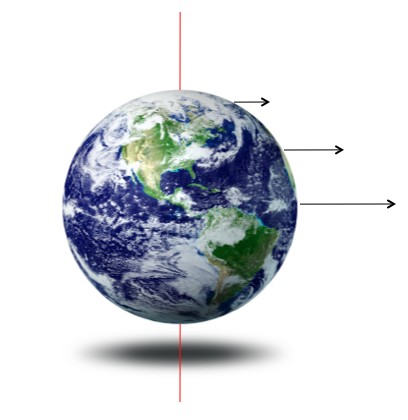Physicist: Centrifugal force* due to the spinning of the Earth is certainly a measurable effect, but it’s a small effect. While the spinning of the Earth doesn’t directly affect gravity, it does off-set it a little. At the north and south poles objects weigh exactly what they should, and at the equator things weigh slightly less.
Assuming that the Earth is round (which is a pretty good assumption), with a back of the envelope calculation you can figure out the centrifugal force trying to fling you into space. At the equator (where it’s strongest) that force is approximately 0.35% as strong as Earth’s gravity (0.0035 g’s). So, if you weigh 300 pounds in Ecuador you’ll find that you weigh almost 301 pounds at the Amundsen-Scott South Pole Station. 0.35% doesn’t seem like much, but it would have a profound affect on at least a few historical events.
Centrifugal force always points out from the Earth’s axis, whereas gravity always points toward the Earth’s center. So you’d think that somewhere between the poles, where the centrifugal force is zero, and the equator, where it points straight up, that there would be a place where it points a bit sideways.

The farther you are from the Earth’s axis the more centrifugal force you’ll experience. At a latitude of ±45° it pulls sideways more than anywhere else.
Turns out, that place is at 45° north and south latitudes where you “should” find that things get pulled sideways with a strength of half of the maximum: 0.17% g’s. If the Earth was perfectly round, then this would be exactly the case, and everything in Europe would have to be built slightly tilted (if you’re wondering, the Tower of Pisa would be leaning the wrong way). However, fluids (and the ground is basically a fluid) move so that the net force always points directly into their surface.

A spinning trough of water. Gravity points down and is constant, while the centrifugal force points out and increases with distance. The surface of the water is always perpendicular to the combined force.
By being distorted a little (an extra 20 km at the equator) the combined gravitational/centrifugal force always points straight up and down. So, if the Earth were to stop spinning right now then we’d find that buildings were tilted very slightly, things at the equator would suddenly weigh 0.35% more, and eventually the Earth would settle into a more perfectly spherical shape.
Now, if the Earth were to literally come to a sudden and abrupt stop: that would be lots of bad. Things at the poles would be fine, but the closer to the equator the greater the change in speed. At the equator everyone and everything would suddenly find themselves moving east at mach 1.4 (1,038 mph), and every land mass near the equator would be thoroughly scrubbed by the oceans washing over them. The economy would take a real hit if the Earth suddenly came to a stop.
*Any time that centrifugal forces are mentioned in the vast crucible that is the internet, a small but vocal cadre makes it known that the centrifugal force isn’t really a force. Be cool.







Pingback: O que aconteceria se a Terra parasse de girar? - Ah Duvido
Pingback: Here’s What Would Happen If The Earth Suddenly Stopped Spinning – Passnownow